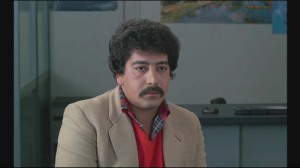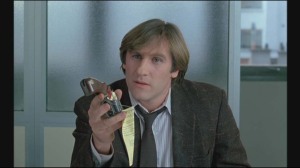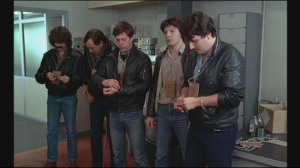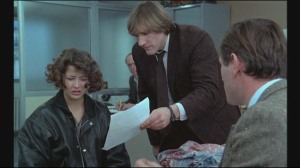Can art ever articulate the truth? The films of Maurice Pialat display a grave ambivalence towards that question. With his first film, L’Enfance Nue (1968) Pialat showed a real animosity towards not only traditional forms of cinematic story-telling, but the very conceit and artificiality of fiction itself. Pialat is a director who wants to put the real world on the screen without the traditional intermediaries of editorial or narrative. However, despite this hostility to the artificiality of artistic representation, Pialat never returned to his roots as a documentary film-maker. Instead, he produced films such as Nous Ne Vieillirons Pas Ensemble (1972) and La Gueule Ouverte (1974). Films that presented themselves as traditional dramas, but which were in fact elaborately dramatised autobiographical meditations upon his own life.
Police is a film that continues Pialat’s tradition of ontological uncertainty. It is a work of genre by a film-maker who loathed fiction and a character study by a man who seemed to believe that there was no such thing as the self. Unsurprisingly, Police is a film that exists under a permanent ontological fog.

DVD Cover
The film opens in a register that will be familiar to fans of police procedurals such as The Wire, The Bill and the Maigret books of Georges Simenon. Its opening scenes focus very much upon the mundanities of a police investigation : We see detectives making coffee, detectives discussing the prices of their leather jackets, detectives moaning about not getting to eat until late, detectives teasing each other in the break-room, detectives interviewing criminals while other interviews go on in the background and attention is paid to such practicalities of policing as the fact that the gaolers are all retired policemen. Script-writer Catherine Breillat reportedly embedded herself with the Parisian Judicial Police in order to research the script and the result is undeniably a realistic depiction of not only police culture but their methods too. This is perhaps why Pialat was attracted to the idea of making a police procedural. Of all the crime novel sub-genres, the procedural is the one with the most fervent devotion to the aesthetic goal of realism. Breillat’s script was not merely inspired by the detectives she spent time with, large chunks of real-life dialogue were evidently re-used verbatim in the script.

Still from Film
However, from the opening shot, one can sense Pialat’s frustration with the narrative conventions of the genre he has chosen to operate in. The film opens on a awkward-looking Tunisian staring almost directly into the camera. Then, a hand is slammed upon a desk and Inspector Mangin (Gerard Depardieu) makes his appearance. The cut from the Tunisian to Mangin is strangely sloppy. It does not take place as the hand is slammed or immediately before it in such a way as to show the hand being slammed on the desk. Instead it happens off-camera and we skip to Mangin in mid-sentence. Clearly a cut to the slamming hand of an irate detective proved too formulaic for Pialat even in his opening shot. Yet nonetheless he chose to include it along with the kind of interrogation that is now slightly old hat.

Still from Film
However, within the almost clicheed nature of this opening scene, there is movement. Pialat is at work. The Tunisian goes by the name of Claude in order to appear more French. Even though he is quite obviously an Arab. As Mangin interrogates him, he moves somewhat unpredictably between personas. One minute he is offering to make a lesser charge go away and whispering “I’ll protect you. You have my word” and the next he is shouting at the man and demanding more and more information. He is both good cop and bad cop and yet there are no tensions between the two personas. They are both part of Mangin’s identity. This two-facedness is reflected in Claude’s French name and Arabic appearance, a trait he shares with the gang of Tunisian drug dealers he informs upon. Three brothers named Simon, Maxim and Jean. In fact, the only person with an Arab-sounding name in the gang is Simon’s girlfriend Noria (Sophie Marceau) and she is White. Or, as Claude puts it, “une Gaulloise”, a Gaul.

The Unhappy Couple
Pialat’s ambivalence towards the genre aspects of the film is also evident in the way that the film is littered with unexplained temporal gaps. After Mangin interviews Claude we see him kicking in the door of Simon’s apartment and it is only afterwards that we learn that, in between scenes, there was an investigation that lasted months and which involved close surveillance and phone tapping. Similarly, having shown us Simon’s interview at the hands of Mangin and his un-named colleague from Marseilles (at the time the race-hate capital of Europe as Jonathan Meades once put it), Pialat completely loses interest in him, revisiting him only much later when Noria goes to visit him in prison. This makes for a rather jarring viewing experience as it is as though the narrative completely wanders off track half-way through the film. However, if one keeps one’s eye on the thematic ball, Police reveals itself to be a remarkably coherent piece of film-making.

Could you pick the criminal out of this line-up of detectives?
While Pialat seems incredibly uncomfortable going through many of the motions required of the genre film-maker, he pounces on some old ideas with genuine glee. One of the old saws of the police procedural and hard boiled crime fiction in general is the idea that there is little real difference between the police and the criminals they pursue. This idea appears most notably in series such as The Wire but it was even around in 1931 when Fritz Lang made his serial killer film M. Police unpacks this idea by examining the ways in which both the police and the crooks wear different identities in different situations. This idea is foreshadowed in Mangin’s opening one-man good cop/bad cop routine but it only really becomes apparent once the film moves beyond the initial narrative confines of an investigation and into a much broader dramatic idiom.

Innocent victim

Accomplished Criminal
Noria presents herself, while being interviewed, as a naïve young thing who took up with the wrong bloke. As a White woman dating an Arab man, she plays on the racism of the French police to set herself up as a victim. However, the second she is set free we see her engaging with her boyfriend’s brothers as a skilled criminal. She steals the keys from someone’s key-ring with consummate skill and then calmly waltzes off to burgle his house without a care in the world. This two-facedness is also apparent in a café owner who pleads helpful innocence and ignorance to the police while being an integral part of the gang. However, those on the side of the law are no more coherent in their actions or viewpoints. Mangin is initially presented as a tough guy with a dislike for women (he slaps Noria and suggests that his future commander start working the streets) but, outside of work, he is affectionate and almost shy.

The Softer Side of Mangin
When a prostitute he knows is beaten up, Mangin invites her to stay in his flat and while he flirts with her, he treats her well and respectfully and while he may get somewhere with her, there is nothing exploitative or unpleasant about the relationship. They are simply two people who happened to find each other. Similarly, after a night out drinking with Noria and her lawyer boyfriend Lambert (Richard Anconina), Mangin tries it on with practically every woman he encounters and he is remarkably charming. He very nearly seduces his future commander and his line is so convincing that, for the first time, she looks not like a grinning little girl but a woman who is forced to make a grown up decision. These scenes have a clear ambivalence about them. Which is the real Mangin? Is he manipulative as well as a misogynistic bully? Or does he genuinely believe what he is saying to these women? One answer is that Mangin’s identity is as fluid as it seemed during the opening interrogation. Mangin is the good cop, he is the bad cop, he is the misogynistic bully and the vulnerable romantic.

Mangin Strikes Out Once...

...Twice...

Three Times
Noria initially rejects his advances but then invites him to try again and when the couple get together they have a real chemistry. But why does Noria invite Mangin to try again? Much like Mangin, she seems to have a fluid identity. When it suits her, she is the naïve and good-hearted woman who got sucked into a bad crowd, but she is also the manipulative liar and accomplished crook. She is both.

On Second Thoughts... Yes!
As in Nous Ne Vieillirons Pas Ensemble, Pialat presents us with a dysfunctional relationship between people who are unwittingly identical. In Nous Ne Vieillirons Pas Ensemble, the male character treats his girlfriend in a way that suggests that he does not care at all about her, but when the film shifts emphasis and it is the female character who stops caring about the male character, her abandonment is presented as a cruel act with terrifying psychological effects upon the male character. Nous Ne Vieillirons Pas Ensemble drew explicitly upon Pialat’s life and there are grounds for thinking that Police did too. Pialat’s depiction of the couples suggest that, while he was aware of how monstrous he could be to the women he loved, he was also aware of his own hypocrisy and the inconsistencies in his temperament and identity. In Police, Mangin accuses Noria of being cold-hearted, uncaring and a locked tower because of her expediently fluid sense of self. But such accusations could just as easily by levelled at Mangin himself! There is no real Noria (something reflected in the fact that she admits the name was something the brothers gave her), but there is no real Mangin either. There is only the mask they are presenting the world at that moment. The film’s closing scene draws its power from that terrible fact as Mangin plays the role of the abandoned lover while Noria accepts that of the heartless vagabond. And yet, Noria is the one who, romantically, asks for one last kiss while Mangin’s response is to tell her to piss off.

Piss Off Noria
You often encounter works that are praised for their deconstruction of genre conventions but what people usually mean by that is that the genre conventions are engaged with in such a way as to move the genre forward. The boundaries shift slightly but the conventions are still in place and the work is still ultimately swaddled in the familiarity that comes from formulae, even if the formulae has been slightly re-written. Police is a work that deconstructs not only genre conventions but the conventions of art in general. It seems designed to invoke a series of question marks that it then hangs over every aspect of this film. Is this a work of genre cinema? Possibly. Is this a drama? Possibly. Is this a character study? Possibly. Is this a film based upon the real world? Possibly. Police is a film that picks at the philosophical underpinnings or art itself by displaying a deep antipathy to any and all intellectual constructs from narrative to theme to character. Police‘s ultimate challenge is to the question of identity itself : If one can cast doubts over all aspects of a film, is it not possible that we are deluded in other matters? Matters more personal and important to us? Noria and Mangin are characters who don masks as the situation determines, but as these masks are ripped away by circumstance and the shifting sands of expediency and self-preservation, they discover that ultimately all they have are the masks they don. The personal truths they utter are the truths of the moment, of random emotional pulses caused by hormonal discharges in various parts of the brain. There is no real Noria, nor a real Mangin. We are all locked towers but the truth is that the towers are all empty.
[…] Police (1985) [Ruthless Culture] : Impressive if somewhat incoherent film. Initially an intriguing little police procedural […]
LikeLike